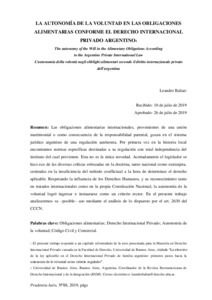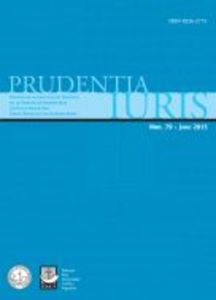Por favor, use este identificador para citar o enlazar este ítem:
https://repositorio.uca.edu.ar/handle/123456789/9638| Título: | La autonomía de la voluntad en las obligaciones alimentarias conforme el derecho internacional privado argentino The autonomy of the will in the alimentary obligations according to the Argentine Private International Law L'autonomia della volontà negli obblighi alimentari secondo il diritto internazionale privato dell'argentina Leandro |
Autor: | Baltar, Leandro | Palabras clave: | DERECHO INTERNACIONAL PRIVADO; CODIGO CIVIL Y COMERCIAL; ALIMENTOS. DERECHO; DERECHO DE FAMILIA; OBLIGACIONES | Fecha de publicación: | 2019 | Editorial: | Universidad Católica Argentina. Facultad de Derecho | Cita: | Baltar, L. La autonomía de la voluntad en las obligaciones alimentarias conforme el derecho internacional privado argentino [en línea]. Prudentia Iuris. 2019, 88. Disponible en: https://repositorio.uca.edu.ar/handle/123456789/9638 | Resumen: | Resumen: Las obligaciones alimentarias internacionales, provenientes de una unión matrimonial o como consecuencia de la responsabilidad parental, gozan en el sistema jurídico argentino de una regulación autónoma. Por primera vez en la historia local encontramos normas específicas destinadas a su regulación con total independencia del instituto del cual provienen. Esta no es la única novedad. Acertadamente el legislador se hizo eco de las diversas críticas esbozadas en la doctrina, tanto nacional como extranjera, centradas en la insuficiencia del método conflictual a la hora de determinar el derecho aplicable. Respetando la influencia de los Derechos Humanos, y su reconocimiento tanto en tratados internacionales como en la propia Constitución Nacional, la autonomía de la voluntad logró ingresar e instaurarse como un criterio rector. En el presente trabajo analizaremos su –posible– uso mediante el análisis de lo dispuesto por el art. 2630 del CCCN. Abstract: International maintenance obligations, coming from a marriage union or as a consequence of parental responsibility, enjoy autonomous regulation in the Argentine legal system. For the first time in local history we find specific norms destined to its regulation with complete independence of the institute from which they come. This is not the only novelty. The legislator rightly echoed the various criticisms outlined in the doctrine, both national and foreign, focused on the insufficiency of the conflict method when determining the applicable law. Respecting the influence of Human Rights, and its recognition both in international treaties and in the National Constitution itself, the autonomy of the will managed to enter and establish itself as a guiding criterion. In this work we will analyze its -possible- use by analyzing the provisions of art. 2630 of the CCCN. |
URI: | https://repositorio.uca.edu.ar/handle/123456789/9638 | ISSN: | 0326-2774 2524-9525 (on line) |
Disciplina: | DERECHO | Derechos: | Acceso abierto | Fuente: | Prudentia Iuris, 88, 2019 |
| Aparece en las colecciones: | PI - 2019 nro. 88 |
Ficheros en este ítem:
| Fichero | Descripción | Tamaño | Formato | |
|---|---|---|---|---|
| autonomia-voluntad-obligaciones.pdf | 188,6 kB | Adobe PDF |  Visualizar/Abrir | |
| prudentia88.jpg | 29,72 kB | JPEG |  Visualizar/Abrir |
Visualizaciones de página(s)
526
comprobado en 27-feb-2026
Descarga(s)
967
comprobado en 27-feb-2026
Google ScholarTM
Ver en Google Scholar
Este ítem está sujeto a una Licencia Creative Commons

